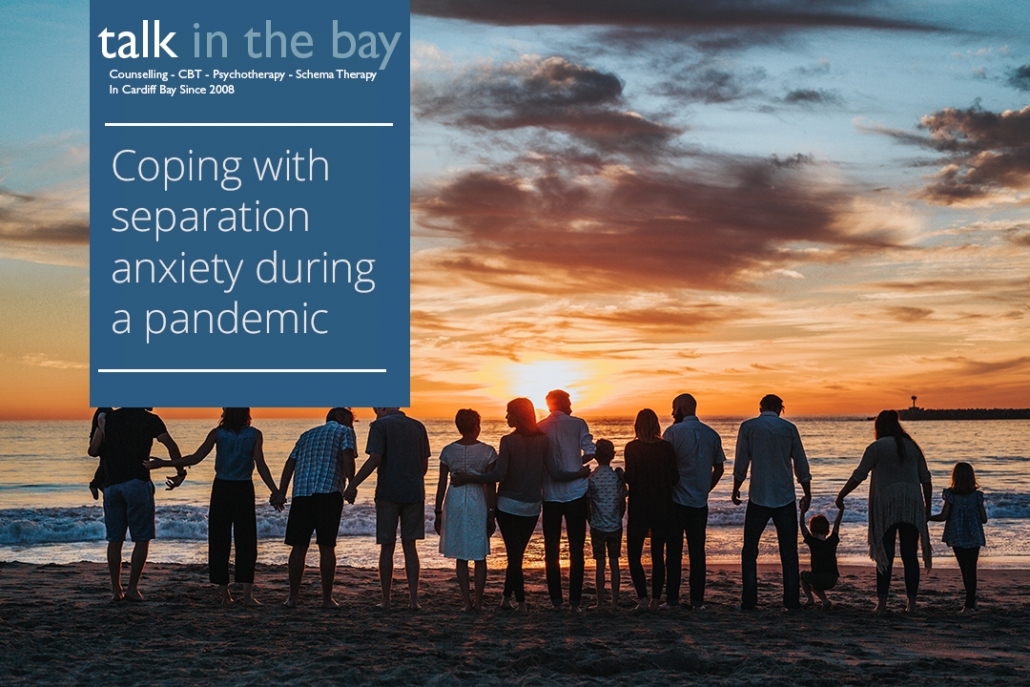In preparation for World Mental Health Day, Talk in the Bay shares thoughts on how to deal with Separation Anxiety
Today is World Mental Health Day 2020, which supports mental health for all. On this important awareness day, and during a year like no other, we talk about the separation anxiety that can be caused by a global pandemic. We discuss positive coping strategies for preserving good mental health, and how to manage and minimise the distress that can come from being separated from someone, or somewhere, that you love…
What are the signs of separation anxiety?
Whether it’s children being separated from their parents with a return to school, or elderly relatives unable to see their families and friends due to government social distancing rules, separation can be difficult. Being kept apart from a particular person or loved one can result in extreme anxiety and distress.
The symptoms of separation anxiety include:
- Unusual distress about being separated from a person, pet or familiar surroundings and avoiding activities that result in separation
- Children may be clingy and may fear being alone in a room, or may need to see a parent at all times
- Adults may be socially withdrawn, or show extreme sadness or difficulty concentrating when away from loved ones
- Physical symptoms at the prospect of separation (e.g. headache, stomach ache, nausea, panic attacks, sleep difficulties)
- Constantly imagining worst-case scenarios about loved ones
- Needing to know where a parent, spouse or loved one is at all times.
Can I get separation anxiety by being away from home?
Yes, you can. As human beings, we’re not only emotionally attached to people and pets, but also to the places and familiar surroundings we have a special bond with.
The pandemic has seen most of us spending a large part of this year at home, surrounded by what helps to make us feel secure. Leaving these familiar places to return to work, school or previous routines can be very difficult.
So, in the same way we can feel separation anxiety when we’re away from our loved ones, we can also feel it when we have to leave the places that feel like our ‘safe haven’.
Tips for handling separation anxiety
Whether you’re a parent wanting to help your child adjust to time apart from you, or an adult seeking ways of coping when you’re away from loved ones, there are some things you can do to help manage separation anxiety:
Helping your child with separation anxiety
- Practice separation: Help your child get used to separation by gradually increasing the time they’re left with a caregiver. Help them to learn they will be ok while you’re gone and understand you will always come back
- Make plans: Talk about what you’ll be doing when you see your child again so they can have something to look forward to
- Listen to and respect your child’s feelings: Learning how your child experiences separation anxiety, understanding and listening to them can have a powerful healing effect
- Keep calm during separation: Anticipate times of separation anxiety. Try and stay in control of your emotions to help your child stay calm during these times too
- Say goodbye positively: Don’t sneak away while they’re distracted, instead smile and wave goodbye confidently. A swift departure routine can help your child adjust to you leaving
How to cope with adult separation anxiety
In adults, separation anxiety can develop after the death of a loved one or following a significant event such as leaving for university or relocating. But the pain of being apart from family and friends in a coronavirus world can also produce extreme sadness and trigger anxiety around separation.
Try the following tips to help you cope:
- Practice relaxation techniques: Try yoga, meditation, mindfulness, and deep breathing to help you ‘ride out’ physical sensations of anxiety
- Identify your negative thoughts: Your feelings result from your thoughts and not always from what has actually happened. By challenging your thoughts, and changing the way you think, you can change the way you feel.
- Write a journal: Writing is great therapy and reading your own words on what makes you anxious and fearful can help to strip these negative emotions of their power
- Focus on what you can control: Establish and maintain a routine and ensure you make time during your day for exercise, hobbies and relaxation
- Consider alternatives to face-to-face contact: To ease anxiety, it’s important to maintain social interactions. During the pandemic regularly check in with people you care about using phone calls and video calling on FaceTime, Zoom, Skype, WhatsApp or Messenger.
Finding support for separation anxiety
Positive coping strategies and embracing new approaches can go a long way in helping with your separation anxiety. But if your efforts to reduce the symptoms don’t work, it’s a good idea to seek professional help. If you would like some professional emotional support to help with your anxiety around separation, please get in touch or call us on 02920 103173. We’re here to help and we want you to emerge from this pandemic as healthy and happy as possible.



